LEXINGTON BOOKS
A division of Rowman & Littlefield Publishers, Inc.
A wholly owned subsidiary of The Rowman & Littlefield Publishing Group, Inc.
4501 Forbes Boulevard, Suite 200
Lanham, MD 20706
PO Box 317
Oxford
OX2 9RU, UK
Copyright 2005 by Lexington Books
All rights reserved . No part of this publication may be reproduced, stored in a retrieval system, or transmitted in any form or by any means, electronic, mechanical, photocopying, recording, or otherwise, without the prior permission of the publisher.
British Library Cataloguing in Publication Information Available
Library of Congress Cataloging-in-Publication Data
Seung, T. K., 1930
Nietzsches epic of the soul : Thus spoke Zarathustra / T. K. Seung.
p. cm.
Includes bibliographical references (p. ) and index.
9780739158234
1. Nietzsche, Friedrich Wilhelm, 18441900. Also sprach Zarathustra. 2. Superman (Philosophical concept) 3. Philosophy. I. Title.
B3313.A44S48 2005
193dc22
2005006553
Printed in the United States of America
 The paper used in this publication meets the minimum requirements of American National Standard for Information SciencesPermanence of Paper for Printed Library Materials, ANSI/NISO Z39.481992.
The paper used in this publication meets the minimum requirements of American National Standard for Information SciencesPermanence of Paper for Printed Library Materials, ANSI/NISO Z39.481992.
For my lovely grandchild
Elyssa Naeun Kim
Preface
Thus Spoke Zarathustra is Nietzsches most enigmatic work. It has posed enormous difficulties for interpretation. We cannot even be sure what kind of book it is supposed to be. On the surface, it looks like a collection of speeches or aphorisms. But it has been called a tragedy, a comedy, and even a parody. For any given literary work, the recognition of its genre provides the basic framework for its interpretation. But such recognition does not come easily for Nietzsches masterpiece. This is what Robert Pippin calls the basic problem of how to read Zarathustra. This problem becomes immensely magnified when we try to see the thematic connection of various sections. Their succession appears to be as arbitrary and as accidental as the succession of notes in serial music. Pippin says that there is nothing close to a standard reading of the works intention, form, development, resolution, or lack of resolution. This gloomy view is resoundingly seconded by Alexander Nehamas, according to whom the single most serious problem with Zarathustra is the fact that the book resists a unified reading, concealing its general structure and strategy, its overall point. He goes on to say, Despite some efforts to read Zarathustra as a coherent whole, most of Nietzsches readers still only dip into the book here and there, dazzled by its brilliant parts and passing over the rest in silence. This is surely not a satisfactory response to what Nietzsche regarded as his most profound gift to humankind. In this book, I propose to remedy this situation by disclosing the thematic unity of Nietzsches mysterious work.
By and large, this work has been read as a collection of philosophical speeches that Zarathustra gives for the edification of his audience. But it is impossible to find a coherent development of philosophical ideas in the sequence of those speeches. Such a development is mercilessly disrupted by the frequent intrusion of those sections that contain no philosophical ideas. The most notable example is Part IV of Thus Spoke Zarathustra. It reads like a burlesque. Many commentators try to cope with this anomaly by severing it from the first three Parts and treating it as an unwelcome and embarrassing addition. Even those who do not outright disown Part IV regard the first three Parts as Zarathustra proper and the last Part as a comic relief from the serious discussion in the first three Parts. The sequence of these two segments is supposedly modeled after the sequence of high tragedy and humorous satyr play in the ancient Greek theater. They have tried to justify this interpretive measure on the ground that Part IV was privately circulated after the official publication of the first three Parts.
Unfortunately, the severance of Part IV does not solve the problem. Even Part III contains too many sections extraneous for the exposition of philosophical ideas. Its last section, The Seven Seals, presents no philosophical aphorisms. It is a song of seven stanzas, each of which ends by expressing Zarathustras ardent love for Eternity. The preceding section, The Other Dancing Song, is equally extraneous to philosophical exposition. It records Zarathustras game of love with Life. These two sections of Part III are concerned with his existential problem rather than any philosophical message. So are the two sections before The Other Dancing Song. The Convalescent chronicles Zarathustras seven-day ordeal with a monster from the abyss, and On the Great Longing describes the deep melancholy of his soul and foretells her future redeemer. Thus the last four sections of Part III recount a sequence of momentous events that overtake him as an existential subject. But his existential agony is not contained completely within these last four sections of Part III. It is already poignantly expressed in the three songs, The Night Song, The Dancing Song, and The Tomb Song of Part II. Even if all these existential passages are excised, there is still one more remaining problem. Zarathustras philosophical message is internally incoherent. In Part I, he advocates the creative will. But the ground of creativity is eradicated by his vision of eternal recurrence in Part III, which reduces all human beings to helpless puppets. Whatever they do will be the repetition of what they have done countless times in the previous revolutions of the eternal ring.
There is no way to secure the thematic coherence of Zarathustra by reading it as a collection of philosophical speeches. Those speeches are so perplexing and so incoherent that many sensible but cautious scholars have wisely kept themselves away from this thicket of confusing ideas and conflicting themes. But I dare propose a new way to unravel this thematic tangle. This is to focus on the works existential overtone and read it as a poem that features Zarathustra as a tragic hero. Nietzsche had this in mind in his reference to Thus Spoke Zarathustra as a tragedy in The Gay Science 342. But it is not like the Greek tragedy, which brings about the devastating destruction of a tragic hero. Nietzsches work is a tragedy in the same sense as Goethes Faust is. When Goethe calls this play a tragedy, he only means that it is concerned with a serious theme rather than a lighthearted one. This is the meaning Nietzsche gives to the word tragedy in his discussion on the alternation of the age of comedy with the age of tragedy in the opening section of The Gay Science. The tragic hero Zarathustra is redeemed just as Goethes hero Faust is saved by the end of the play. Hence it is less misleading to call these two works epics rather than tragedies. So I want to classify Nietzsches long poem as an epic. This is the framework for my poetic interpretation of Zarathustra.
My project is to establish and articulate the epic unity of Nietzsches poem. My first step is to identify and elucidate the main thematic ideas of the book. I have identified two such ideas: the concept of a sovereign individual and the concept of a deterministic universe. By the sovereign individual I mean an individual who recognizes no authority higher than his or her own. This is the watershed between modern and pre-modern political philosophy. In ancient Greece and medieval Europe, it was not the individuals, but the state or the community that was assumed to have sovereignty. But modern political philosophy began with the premise that sovereignty belongs only to the individuals as their inalienable right and that the state is formed by the consent of these sovereign individuals. Implicitly or explicitly, all contractariansHobbes, Locke, Rousseau, Hume, and Kanthave accepted the sovereignty of individuals as the basic premise for their theories of the state. In Thus Spoke Zarathustra, individual sovereignty covers a much broader scope than the political arena. It commands all phases of human existence. It is the sort of sovereignty that used to be attributed only to God and never to any human beings. Such a sovereign individual is called the superman because he or she transcends the limits of humanity.


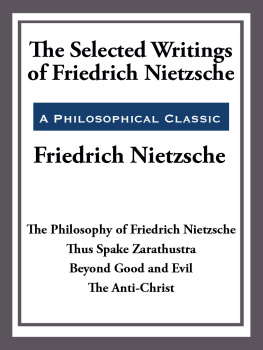
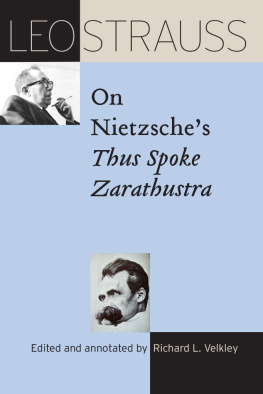
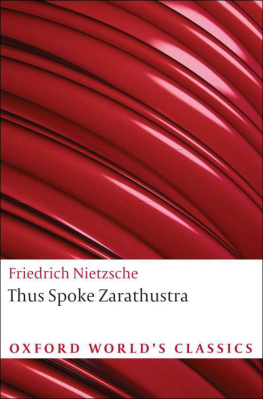
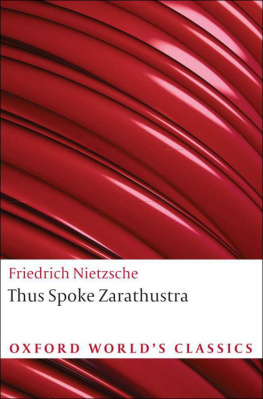
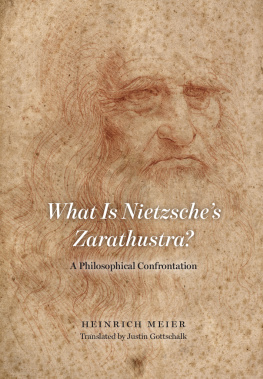

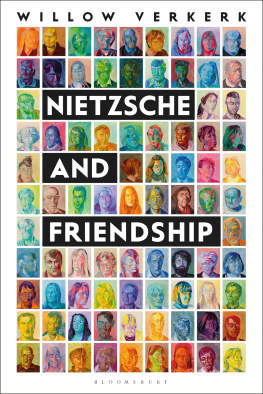
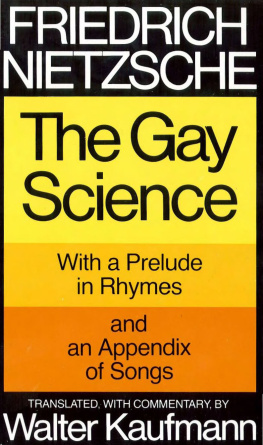

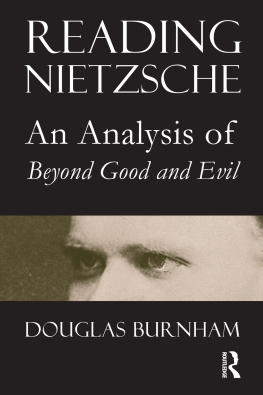
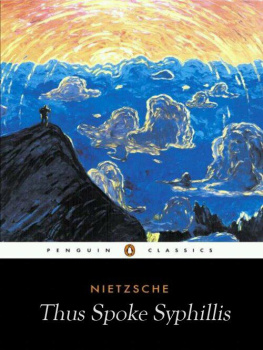

 The paper used in this publication meets the minimum requirements of American National Standard for Information SciencesPermanence of Paper for Printed Library Materials, ANSI/NISO Z39.481992.
The paper used in this publication meets the minimum requirements of American National Standard for Information SciencesPermanence of Paper for Printed Library Materials, ANSI/NISO Z39.481992.